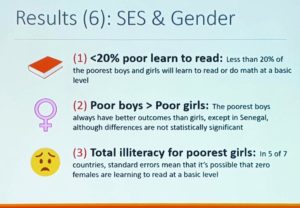In April the full Echidna Giving team attended the Comparative and International Education Society. We enjoyed welcoming thousands of our friends working on international education to our home city of San Francisco. Below are six of our lasting impressions from CIES:
1 | Researchers are unpacking the depth and nuance around life skills and social and emotional learning. For example, in a panel on “examining the rise of “life skills” education programming for adolescents in developing country contexts,” Erin Murphy-Graham, Joan DeJaeghere, and Urvashi Sanhi spoke about two elements integral to life skills that are rarely explicitly included in life skills frameworks. The first element was power. If we expect education to engender equality, we need to reckon with issues around gender and power. The second element was relationships, which could be conceived of as an explicit goal for life skills programming, not simply a by-product. In another session, Matthew Jukes presented research on the social and emotional competencies that teachers and parents in rural Tanzania view as important—and found discrepancies between the two with teachers desiring curiosity and independence and parents valuing respect and obedience. The community discussed competencies in terms of social relationships. This research underscores the need to better understand not only how different academic disciplines conceptualize and define life skills, but also how communities themselves conceptualize these skills.
2 | This slide from Nick Spaull on learning outcomes in West Africa:

3 | Making good on the SDG commitment to secondary education for all will not be easy. A panel on “Minding the gaps: With more sub-Saharan African governments introducing free secondary school education, what barriers persist for marginalized girls?” highlighted just how many barriers persist, from being able to get into school, to being able to afford non-fee expenses, to getting something of value out of schools in which levels of learning remain dismally low. It is reasonable to debate whether eliminating secondary school fees is desirable. In countries where few students finish primary school, wealthy students who can get to secondary school will benefit the most. Eliminating fees specifically for marginalized groups would be more progressive. On the other hand, it may be more cost effective to eliminate fees for everyone than to figure out how to target resources to those who need them most. And it still helps people who wouldn’t otherwise go to secondary education, increasing prospects for economic growth. Are we thinking too narrowly by trying to get every child through traditional secondary schooling? This may be misguided both because it’s too expensive for governments to replicate existing models and because the systems aren’t working terribly well to begin with. Are there alternative models that could deliver meaningful learning needed and be more affordable?
4 | People are eager to hear about failure. Lots of folks expressed appreciation for honest discussion about results that weren’t so positive (like critical reflection on teacher professional development and fadeout of preschool effects). This reflection on an early childhood intervention in Cambodia is another great example of learning from failure. We hope these models give others the confidence to share failures that we can all learn from. But we also realize there is a tricky dynamic here and sharing of failure isn’t always rewarded. Our own belief is that the true failure is the failure to learn—and we’re always eager to hear how we, as a funder, can best live this belief.

5 | The debate on privatization is heating up. The Economist wrote a glowing review of private education, but not everyone agrees. “The Abidjan Principles promises to be the new reference point for governments, educators and education providers when debating the respective roles and duties of states and private actors in education.” Here is a good summary of some of the current debates.
6 | The view from up high can be stunning…and incomplete. As we enjoyed the view over the Ferry Building and Bay Bridge, we appreciated a new perspective on our own city. In a similar vein, we saw a real hunger for the broader perspective of what works in girls’ education from the research of David Evans (highlighted in our prior post) and a complementary piece of work by the Population Council to look at gender-specific barriers to education. At the same time, views from on high only tell you so much about what’s really happening down below. Similarly, systematic reviews may be a good starting point but need to be contextualized.
We know there was a lot happening at the conference that we didn’t get to see, so please feel free to share your own impressions in the comments section.
